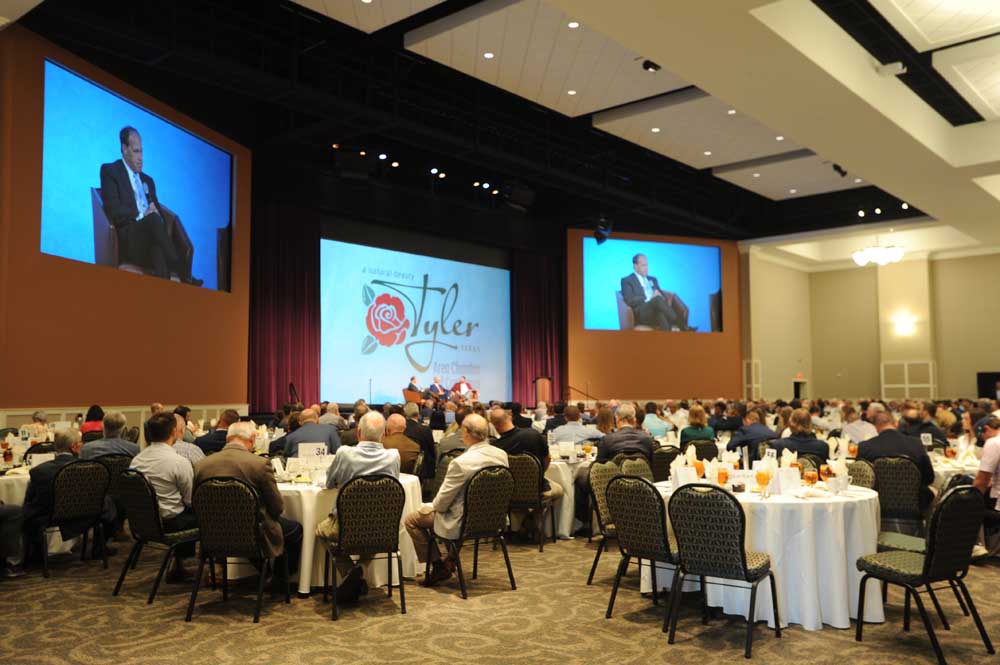Texas Energy Summit spotlights oil, gas, CO2 debates
Published 5:40 am Friday, March 28, 2025

- A view of the Green Acres Baptist Church Crosswalk Conference Center in Tyler, where the 14th annual Energy Summit took place on March 25. (Katecey Harrell/ Tyler Morning Telegraph)
The Tyler Area Chamber of Commerce Energy Committee held the 14th annual Energy Summit on Tuesday at the Green Acres Baptist Church Crosswalk Conference Center.
“The energy industry is such an important part of our region that we think it’s important to bring all the important people together to talk about how we can help forward that,” Chamber President Henry Bell said.
The energy summit featured discussions on Texas oil and gas, public utilities, climate change and nuclear technologies, with presentations from industry leaders and experts. The event concluded with an update on the Discovery Science Place’s Energy Exhibit.
Texas Railroad Commissioner Wayne Christian spoke at the event, highlighting the new Trump administration as a fresh opportunity for oil and gas energy.
“It’s a different day for oil and gas,” he said.
Christian said carbon dioxide (CO2) has been labeled a dangerous gas, and that agendas are being pushed in the name of saving endangered species. He believes it was never really about saving animals, but about shutting down oil and gas operations.
He said the Inflation Reduction Act still includes $4.3 trillion to shut down oil and gas. Texas industries want the funds to support initiatives like expanding clean energy projects, improving energy efficiency and advancing carbon capture technologies.
He questioned why a single dime of taxpayer money would be spent on alternative energy when the U.S. has enough clean, cheap, reliable and plentiful oil, gas and coal to last for 500 years.
The greatest threat to the U.S. is the loss of value of the U.S. dollar, Christian said.
Using funds from the Inflation Reduction Act for energy projects can increase government spending and national debt, leading to higher borrowing costs, inflation and a drop in the dollar’s value.
“There’s lots of ways to make money,” Christian said. “That doesn’t make it right.”
Over the last four years, Texas has produced nearly 50% of the country’s oil and gas. One challenge the state may face as the Trump administration opens public lands for production is that both production and profit margins in Texas may decrease.
Gregory Wrightstone, author of Inconvenient Facts and A Very Convenient Warming, spoke about the need to present the truth, science, facts and data without an agenda. He urged pushing back against misleading science used to promote the fake climate crisis narrative.
CO2 levels are currently about 420 parts per million, a 50% increase since the Industrial Revolution, according to climate.gov. While this may seem high, Wrightstone explained that throughout Earth’s history, CO2 levels have been much higher — ranging from 20,000 to 26,000 parts per million.
Plants and crops benefit from more CO2, and right now, there is too little. Wrightstone said CO2 helps crops grow and that mild warming results in longer growing seasons.
“The people promoting the climate crisis, human driven climate crisis are pushing a narrative, and I’m not sure exactly what their entire end goal is,” Wrightstone said. “We can show exactly, as scientists, what the actual data tells us, and in nearly every case, we find that it’s counter to what you’re being told in the mainstream.”
Wrightstone argued that fires have been in long-term decline, not an increase. He also said sea levels are not rising at an accelerated rate, deserts are shrinking, not expanding and crop growth is booming, setting new records every year. Additionally, he said forests are expanding, not shrinking.
“The people in the Lone Star State are benefiting from modest warming and more CO2. We should celebrate CO2, not demonize it. The theme of the talk here was life in the Lone Star state is good and getting better,” Wrightstone said.
The summit concluded with a session on the importance of new nuclear technologies in the energy future.
Sandra Burns, Tyler Metro Chamber of Commerce executive director, agreed that the nuclear energy session was fascinating and she looks forward to learning more about how it could benefit Tyler.
She’s especially interested in how it might boost economic development and expand energy options for the city.
Maxwell Uleh, a consultant with Bassa Enterprise Global Trade, attended the energy summit to meet people and build relationships that could lead to business opportunities.
He is interested in helping American mineral and agricultural companies expand their business in West and Central Africa. As a liaison, he would connect companies in both regions, helping them collaborate and form partnerships.
Uleh learned a lot at the summit and plans to share the information with his partners. He also found the discussion on nuclear energy interesting, even though it was new to him. He appreciated the clear and informative presentations and believes nuclear energy could play a key role in boosting economic growth and competition.
“The panelists, they hit hard on the topics,” Uleh said.






